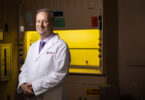Athens, Ga. – Christopher Whalen, the Ernest Corn Professor of Epidemiology in the department of epidemiology and biostatistics in the University of Georgia College of Public Health, has received a five-year, $2.82 million grant to understand how tuberculosis is transmitted in urban environments in Africa.
Funded by the National Institutes of Health, Whalen’s study will be done in conjunction with researchers in Uganda. Dr. Noah Kiwanuka, a professor and physician who teaches at Makerere University, will serve as the principal investigator in Africa.
“We have nine million new disease episodes of tuberculosis each year,” Whalen said. “Even though we don’t face the same problems with it in the U.S., it’s important to remember that infectious diseases don’t regard political borders, and what is over there could show up here.”
Given the ease with which it can be spread, tuberculosis, or TB for short, is a particularly challenging disease to track. Since it can be transmitted from one person’s respiratory system to another, Whalen said it’s possible that an infected individual could enter a crowded room, cough for a period of time and, if the room lacks adequate ventilation, dramatically increase the likelihood of infection for others present in the room.
His research will center on trying to identify where transmission is occurring in a community and what types of human interaction are facilitating the spread of the disease.
Whalen, as a physician, is board certified in infectious disease and previously studied TB transmission inside African households. His past research involved mostly closed environments-where TB cases could be more easily managed through isolating patients and providing necessary treatment.
“Think about the other extreme, where most of the transmissions are occurring in the community,” Whalen said. “Well, then what? How do we control it in a larger community? No one really knows how best to intervene. We have a lot of antidotal evidence, but we need to better understand transmissions, and this study is intended to shed light on the mechanisms of transmission.”
The study also will track a group of patients not infected with TB over the course of one year in an attempt to closely monitor the types of interaction they are having. Researchers will be looking for individuals who become infected during that year, Whalen said, in hopes of chronicling the various social patterns that led to the new infection.
“The whole idea is to try and better understand how TB transmission is occurring within the different communities in Africa,” he said. “We’ve come to realize that in order to control TB effectively, we need to block and reduce the amount of transmission.”
Whalen’s research project the latest in an ongoing partnership with Makerere University, which includes a recent symposium hosted at the college featuring professors and researchers from the Ugandan institution. An upcoming Maymester session at UGA will focus on global perspectives of HIV/AIDS that Whalen and Kiwanuka will teach.
Whalen will travel to Uganda twice a year for the duration of the grant, and a research coordinator from the College of Public Health will likely head overseas two to three times a year. An on-the-ground presence in Uganda will assist with monitoring the progress of the research and also ensure that members of Whalen’s team from UGA are getting a first-hand glimpse of the impact of the disease on the African population.
UGA College of Public Health
Founded in 2005 as a response to the state’s need to address important health concerns in Georgia, the UGA College of Public Health is comprised of four departments and two research institutes as well as the Center for Global Health. The college offers degree programs in biostatistics, environmental health, epidemiology, health promotion and behavior, public health, health policy and management and toxicology as well as certificate programs in gerontology, disaster management and global health. Graduates from the College of Public Health-nationally known for its work related to infectious disease, cancer research, gerontology, disaster preparedness and other areas-typically go on to a diverse range of careers, including medicine, health education, emergency management, public health policy, environmental science and social work. For more information, see www.publichealth.uga.edu.
##







